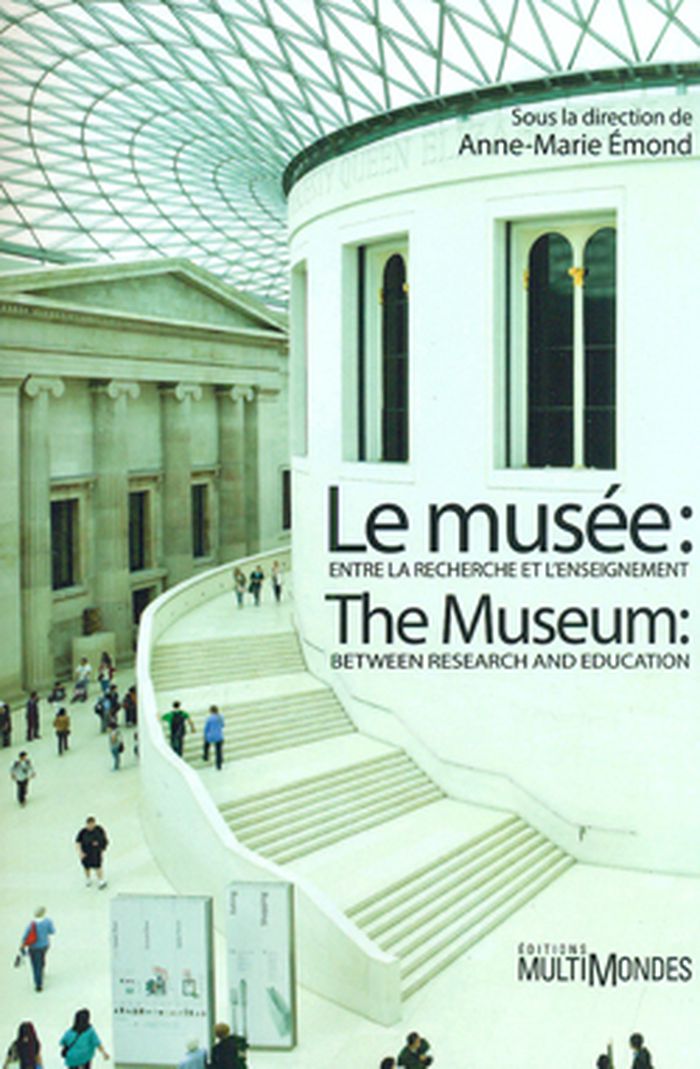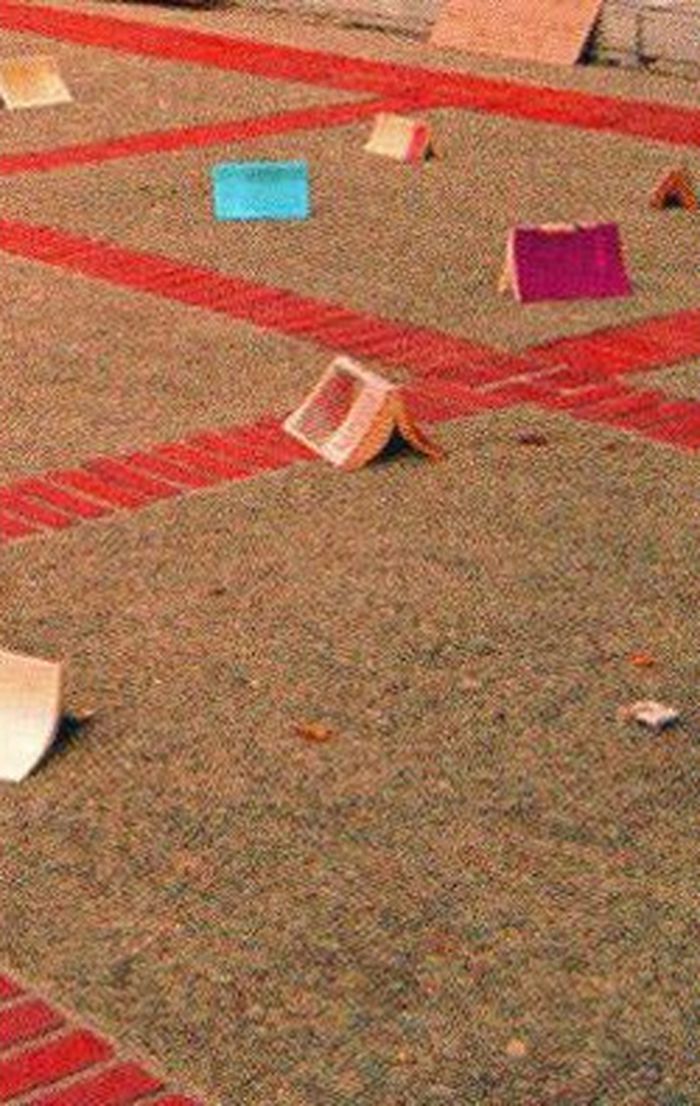$34.95
(available to order)
Summary:
Cet ouvrage s’articule autour de cette nécessité qu’a l’institution muséale de concevoir des activités favorisant un enrichissement intellectuel. Les axes de cet ouvrage, au nombre de deux, sont : le musée en tant que sujet de recherche et le musée en tant qu’outil d’enseignement. Réunissant des chercheurs actifs dans le domaine muséal, ce livre présente un grand(...)
Le musée: entre la recherche et l'enseignement
Actions:
Price:
$34.95
(available to order)
Summary:
Cet ouvrage s’articule autour de cette nécessité qu’a l’institution muséale de concevoir des activités favorisant un enrichissement intellectuel. Les axes de cet ouvrage, au nombre de deux, sont : le musée en tant que sujet de recherche et le musée en tant qu’outil d’enseignement. Réunissant des chercheurs actifs dans le domaine muséal, ce livre présente un grand échantillonnage des recherches en lien avec le musée.
Museology
$134.95
(available to order)
Summary:
This volume highlights the museum as a product of transnational processes of exchange, focusing on the period from ca. 1750 to 1940.
The museum is open: towards a transnational history of museums 1750-1940
Actions:
Price:
$134.95
(available to order)
Summary:
This volume highlights the museum as a product of transnational processes of exchange, focusing on the period from ca. 1750 to 1940.
Museology
Self-organised
$26.00
(available to order)
Summary:
Artists, curators and critics discuss empirical and theoretical approaches from Europe, Africa and South and North America on how self-organization today oscillates between the self and the group, self-imposed bureaucratization and flexibility, aestheticization and activism.
Self-organised
Actions:
Price:
$26.00
(available to order)
Summary:
Artists, curators and critics discuss empirical and theoretical approaches from Europe, Africa and South and North America on how self-organization today oscillates between the self and the group, self-imposed bureaucratization and flexibility, aestheticization and activism.
Museology
$32.50
(available to order)
Summary:
In Ten Fundamental Questions of Curating ten contemporary curators pose and then propose answers to a series of key questions related to curating, art and exhibition making today: What Is a Curator? What Is the Public? What Is Art? What About Collecting? What Is an Exhibition? Why Mediate Art? What To Do with the Contemporary? What About Responsibility? What Is the(...)
Ten fundamental questions of curating
Actions:
Price:
$32.50
(available to order)
Summary:
In Ten Fundamental Questions of Curating ten contemporary curators pose and then propose answers to a series of key questions related to curating, art and exhibition making today: What Is a Curator? What Is the Public? What Is Art? What About Collecting? What Is an Exhibition? Why Mediate Art? What To Do with the Contemporary? What About Responsibility? What Is the Process? How About Pleasure?
Museology
$29.00
(available to order)
Summary:
Keller Easterling’s volume in the Critical Spatial Practice series analyzes the urgency of building subtraction. Often treated as failure or loss, subtraction—when accepted as part of an exchange—can be growth. All over the world, sprawl and overdevelopment have attracted distended or failed markets and exhausted special landscapes. However, in failure, buildings can(...)
Subtraction: critical spatial practice 4
Actions:
Price:
$29.00
(available to order)
Summary:
Keller Easterling’s volume in the Critical Spatial Practice series analyzes the urgency of building subtraction. Often treated as failure or loss, subtraction—when accepted as part of an exchange—can be growth. All over the world, sprawl and overdevelopment have attracted distended or failed markets and exhausted special landscapes. However, in failure, buildings can create their own alternative markets of durable spatial variables that can be managed and traded by citizens and cities rather than the global financial industry.
Museology
Qu'est-ce que le curating ?
$24.95
(available to order)
Summary:
Le terme "curating", qu'on traduit souvent par commissariat d'exposition, n'a pas de véritable équivalent en français. Dans cette conférence tenue à l'École normale supérieure de Paris, il apparaît que l'essentiel du travail du curator réside dans la discussion avec les artistes et la maïeutique de la pensée.
Qu'est-ce que le curating ?
Actions:
Price:
$24.95
(available to order)
Summary:
Le terme "curating", qu'on traduit souvent par commissariat d'exposition, n'a pas de véritable équivalent en français. Dans cette conférence tenue à l'École normale supérieure de Paris, il apparaît que l'essentiel du travail du curator réside dans la discussion avec les artistes et la maïeutique de la pensée.
Museology
$29.95
(available in store)
Summary:
Contestations brings together a range of artists, theorists and other practitioners to consider the state of education and learning in light of political struggle, institutional crisis and new media platforms. Focusing on creative experiments in education, Contestations seeks to instigate a conversation about the future direction of education that challenges existing(...)
Contestations: learning from critical experiments in education
Actions:
Price:
$29.95
(available in store)
Summary:
Contestations brings together a range of artists, theorists and other practitioners to consider the state of education and learning in light of political struggle, institutional crisis and new media platforms. Focusing on creative experiments in education, Contestations seeks to instigate a conversation about the future direction of education that challenges existing academic models while examining possibilities for strategic intervention and self-organisation.
$25.00
(available to order)
Summary:
Since the publication of Thinking Contemporary Curating in 2012, art historian Terry Smith has continued his travels through the globalizing art world, talking to curators. The dozen searching conversations in this book--with Carolyn Christov-Bakargiev, Claire Bishop, Zdenka Badovinac, Mami Kataoka, Mari Carmen Ramírez, Okwui Enwezor, Germano Celant, Jens Hoffmann, Hans(...)
Talking contemporary curating
Actions:
Price:
$25.00
(available to order)
Summary:
Since the publication of Thinking Contemporary Curating in 2012, art historian Terry Smith has continued his travels through the globalizing art world, talking to curators. The dozen searching conversations in this book--with Carolyn Christov-Bakargiev, Claire Bishop, Zdenka Badovinac, Mami Kataoka, Mari Carmen Ramírez, Okwui Enwezor, Germano Celant, Jens Hoffmann, Hans Ulrich Obrist, Maria Lind, Zoe Butt and Boris Groys--provide a vivid sense of contemporary curatorial thought at work. They show curators deeply immersed in thinking about the exigencies of practice, the contexts of exhibition-making, the platforms through which art may be made public, and about what their work can contribute toward understanding what it means to be alive today.
Museology
$48.95
(available in store)
Summary:
Avant-Garde Museology presents essays documenting the wildly encompassing progressivism of late nineteenth and early twentieth-century Russia.
Avant-garde museology. E-Flux classics
Actions:
Price:
$48.95
(available in store)
Summary:
Avant-Garde Museology presents essays documenting the wildly encompassing progressivism of late nineteenth and early twentieth-century Russia.
Museology
$44.95
(available to order)
Summary:
“Soft power” emerged as a concept in the late twentieth century to describe international relations based not on military or economic strength, but on influence. While the resources of “hard power” are tangible—force and finance—soft power resources include ideas, knowledge, values, and culture, as well as the ability to persuade. This volume discusses soft power from the(...)
Cities, museums and soft power
Actions:
Price:
$44.95
(available to order)
Summary:
“Soft power” emerged as a concept in the late twentieth century to describe international relations based not on military or economic strength, but on influence. While the resources of “hard power” are tangible—force and finance—soft power resources include ideas, knowledge, values, and culture, as well as the ability to persuade. This volume discusses soft power from the vantage point of museums and demonstrates how they are quietly changing the world. With contributions by thirteen experts from ten countries, Cities, Museums and Soft Power reveals the world’s 80,000 museums to be sleeping giants. Two major characteristics of soft power—the rise of cities and the role of civil society—are pushing museums from the margins toward the center as these institutions serve as education hubs, employers, magnets for creative industries, and engines of economic development. Meanwhile, the growth of technological networks and connectivity has enabled this soft power to spread even farther and deeper across the Internet and groups of people. Whether cozy and local or internationally renowned, museums possess a cultural strength that extends far beyond their walls.
Museology









